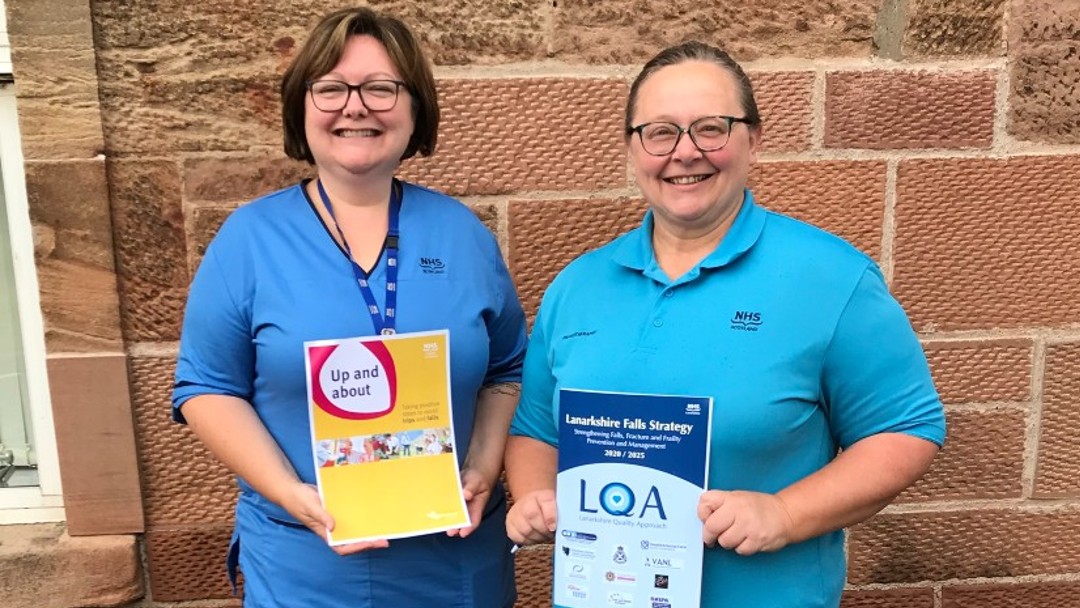It’s not just the NHS celebrating a landmark birthday this summer, as June marked twenty years of NHS Lanarkshire’s Specialist Falls Service.
Based at Coathill Hospital in Coatbridge, this small multi-disciplinary team cover all areas of Lanarkshire. The team have both a clinical and strategic role, as well as supporting improvement work within the community.
As one of the first dedicated falls services in Scotland, this pioneering team have been instrumental in shaping national falls strategy. More recently they have been heavily involved in the development and implementation of the Lanarkshire Falls strategy.
In fact, Lanarkshire is the only place in Scotland that has developed and implemented a falls register. Since its set up in 2014, there are currently 19,114 people on the register.
Falls nurse specialist, Angela Scott, explained: “The register captures anyone who has fallen and includes details of any previous falls, assessment and measures taken and the patient’s level of risk. It is an invaluable resource in capturing the patient’s journey and reducing falls.”
In Lanarkshire an estimated 47,354 people will fall each year. These falls may happen in a person’s own home or in a care setting. Falls can lead to significant injury, in particular, hip fracture. A fall can be significant enough for anyone but a fall for a person who has frailty can have detrimental effects.
Sandra Lawler, a highly specialist physiotherapist and one of the founding members of the falls team, remains in post after twenty years. She said: “I am very pleased to have played my part in developing and now implementing the Lanarkshire Falls strategy. Together with the team I am particularly proud of the Lanarkshire falls pathway and associated training programme that sees a unified approach to falls reduction across Lanarkshire.
“I came to NHS Lanarkshire in 2001 and joined the early supported discharge team. Part of my job was to look at falls but the numbers were so high that we ended up creating a service specifically for falls. We were initially just a falls service for Coatbridge, Airdrie and Cumbernauld. The numbers just went up and up. The more you look for fallers, the more you find them but we need to know who the fallers are in the community.
“At the beginning it was just myself and an occupational therapist and then we brought a nurse into the team and got consultants on board around 2006.”
Angela has been part of the team for 13 years, having previously worked in orthopaedics and A&E in University Hospital Monklands for eight years. Angela was nominated to attend the King’s garden party at Holyrood House for all the community work she does and for her contribution during the pandemic when she set up Communities Together, an organisation that provided food parcels, prescription collections, befriending service and mental health support to her local community. The small team is complete with occupational therapist Ruth Muir.
Angela said: “In my previous roles, I dealt with a number of people coming in with broken hips. Then the role came up in the falls service, so I’m now trying to prevent the patient getting to the broken hip stage or having to attend the emergency department.”
Figures show that people who had a conversation regarding their falls risk in the community (level 1) had a 67% reduction in falls following their interventions.
Angela added: “As part of our five-year falls strategy for Lanarkshire, we work with a number of services and partners to manage that first intervention with patients, including occupational therapy, physio, rehab team, GP practices, pharmacies, ambulance service, fire and rescue service, voluntary service and community alarms. All these services can make referrals into our team.
“We provide assessment and support for people who are falling or at risk of falls. There can be a number of reasons – dizziness, being light-headed or something more complex.
“We have three levels for measuring falls, from level one where the patient has fallen and requires assistance and/or identifying an individual who is it risk of a fall, to level two which is more complex and multi-factorial and requires greater assessment.
“When the patient is in level three, they require a highly-specialised falls assessment by our team. We look at a number of areas in levels two and three – does the patient wear glasses and if so varifocal or bifocal? What footwear do they use?
“A lot of time patients are taking multiple medications so we screen that too as well as checking blood pressure and carrying out an environmental assessment and checking for risks in the home. Can the patient get up after a fall? Do we need to look at community alarms or falls detectors so as soon as they fall it triggers an alarm to the call centre or a family member?”
The service was still running during Covid but that time also allowed the team time to pull the Lanarkshire Falls Strategy together.
Peter McCrossan, director for Allied Health Professions and the NHS Lanarkshire falls lead, commented: “The NHS Lanarkshire Falls Strategy implementation has positively impacted our inpatient falls rate, which is now below the national rate and has improved over the last three years.”
Sandra added: “It has taken a lot of work and time to get a strategy developed. The strategy reflects what we wanted back in 2003 and has the backing of all the different agencies.
“We see mental health issues, loneliness and social isolation so we refer those patients on to other services that help depending on the patient’s needs, such as befriending service that can also benefit carers, volunteer drivers and helping people to get more active and seek other support in the community.
“Part of our role is initial assessment and then signposting to where they need to get best care. We have also been doing falls awareness pop ups, going into community centres to make more people aware of falls and how to prevent falling.
“A number of patients stopped socialising since Covid. This has resulted in a big increase in deconditioning in elderly people which can cause falls. We encourage people to be as active as they can, even those who are housebound can stay active in their own home.”
Nicola O’Donnell, community physiotherapy lead, South Lanarkshire added: “The work that this small but highly motivated and passionate team delivers is pivotal in reducing falls across Lanarkshire. The care and education they offer is built on strong relationships, working side by side with other organisations, and with people and communities themselves to activate, innovate and continually improve the prevention, treatment and awareness of falls in Lanarkshire.
“They are key to the success of the Lanarkshire Falls strategy providing the link for specialist knowledge, skills and resources to ensure best clinical practice.”
The shared vision for Lanarkshire is “where possible more people live a life free from harm from falls” and the falls service will continue striving towards this.
Photo: Angela Scott (left) and Sandra Lawler





